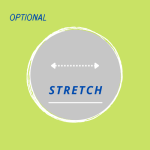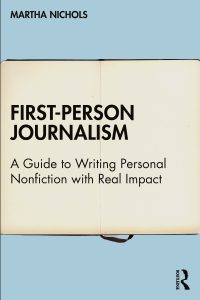Get More from These Lessons
If you’re ready to move on, wrap up the course by going straight to the “Closing Inspiration” and “Final Self-Evaluation.”
But if you want to keep developing your first-person voice, read on for ways to extend these lessons.
 Writing Stretches
Writing Stretches
You’re welcome to do any or all of the lessons again in Finding Your First-Person Voice. If you’d like a re-do, you might try a different order the second time around, such as starting with “Dear World” and ending with “Dear Me.”
Whatever order you do the lessons in, stick to the same four-step sequence of main activities – but add optional activities. You can extend the lessons just by doing all the writing stretches. Many encourage more revision, and you’ll find additional prompts to reflect on in your notebook.
Do all the writing stretches – and try different media.
You might also try different media – photos or cartooning, video, audio recording – to tell personal stories. Getting down certain stories may be easier when you do it by speaking aloud or through imagery. In the short video “Prosopagnosia” by Steven Fraser, for instance, this neuro-atypical cartoonist conveys his difficulty with face blindness (prosopagnosia).[1] Fraser combines animated images with his first-person voice to get across his experience, raising important questions about how we define the self and others.
Don’t forget negative space: Fraser’s video illustrates the value of negative space in both a visual and written format, something to explore in your own stories.
 Read and Listen More
Read and Listen More
The optional activities with each lesson include reading, podcast, and video suggestions. In addition to chapters from my book, First-Person Journalism, I refer to writers as various as James Baldwin, Terry Tempest Williams, Maggie Nelson, Matsuo Bashō, Emmanuel Carrère, and Kurt Vonnegut.
You could create a personal reading program based on my reading references. Footnoted quotes from writers appear throughout the lessons and on the opening pages for each section. The quotes by other writers are voice-driven and relevant to cultivating mental tools for writing. (See “Reading to Spark Yourself.”)
Build your reading habit.
Building a reading habit has benefits beyond helping you as a writer, however. Rather than skimming for information on a screen, reading books and long articles (or listening to long podcasts) encourages contemplation. In a 2022 podcast episode with literacy scholar Maryanne Wolf, “This Is Your Brain on ‘Deep Reading,'” host Ezra Klein notes:
“In Wolfe’s view, our era of information overload represents a historical inflection point where our ability to read – truly, deeply read, not just scan or scroll – hangs in the balance.” [2]
 Find Your Community
Find Your Community
One way to read more is to join a local book group. Many people use book groups to meet others in their community. And yet, traditional book groups aren’t the only way to find a community, especially for writers.
If you’re in a writing group, I encourage you to read books together in addition to sharing the work of group members. If you completed the lessons the first time on your own, find a group to work with before starting them again, including the reading activities. (See “Forming a Writing Group.”)
Organize a group reading.There are also other ways to forge community connections through first-person storytelling. As I emphasize in the “Closing Inspiration,” reading your work or that of other writers aloud has a special kind of magic. Consider organizing a group reading at your local library or another public venue that spotlights the stories of people in the community.
Keep in mind that “community” can be found many ways and not just through geographic location. You may want to join your religious, racial, ethnic, or gender community to share stories. Much of this sharing is already happening online. However, meeting together in person makes it real in a different way. When you’re in the same physical space, whether it’s a crowd at a public reading or a small meeting, you become part of something larger than yourself.
 Polish Your Writing Style
Polish Your Writing Style
I’ve saved these recommendations for last, because they come closest to professional writing advice.
If you’d like more nonfiction writing instruction, read my guide, First-Person Journalism. Work through the “Voice Lessons” in sequence for each chapter. You can do this in tandem with Finding Your First-Person Voice, following my optional “Respond” reading assignments.
This course hasn’t focused on writing rules, but polishing your style matters for getting published. That applies to using correct grammar in the language you’re writing in as well as more general qualities such as brevity, focus, and vividness. In addition to my guide, I recommend the following well-known resources:[3]
- On Writing Well by William Zinsser.
- The Elements of Style by William Strunk Jr. and E. B. White.
- The Chicago Manual of Style.
- The Associated Press Stylebook.
Last but not least, I encourage you to take additional writing classes or to search out the many digital sites with publishing and writing resources.[4]
Follow what sparks you.
The inspiration to keep going can come from many directions, although I’ll testify it’s easier to stay motivated in a class or with a group. Still, how you proceed depends on your own goals and experience as a writer, not to mention the things that spark you.
I wish and hope many creative sparks will light your way.
- "Prosopagnosia" by Steven Fraser, available on the artist's website. This video premiered in 2021 at the Edinburgh International Film Festival. ↵
- From the introduction to "This Is Your Brain on 'Deep Reading.' It's Pretty Magnificent," an interview by Ezra Klein of Maryanne Wolf, The Ezra Klein Show (New York Times), November 22, 2022. ↵
- You'll find all these titles with a quick digital search or at your local library. The Chicago Manual of Style and The Associated Press Stylebook are available online with a paid subscription, making it easier to check their respective style rules. The online AP site includes style quizzes. It's a good tool for anyone interested in American journalistic news or feature writing. ↵
- You might begin with the venerable Writer's Digest or Publishers Weekly. There's also the literary site I co-founded, Talking Writing, which now has a podcast about the joys and stresses of being a creative "lifer." ↵